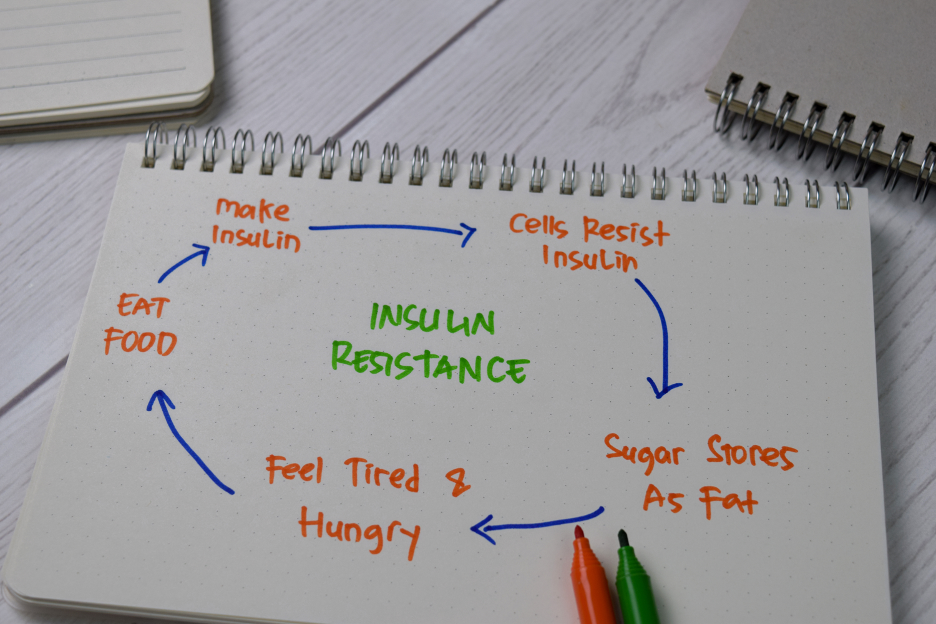According to the National Health and Nutrition Examination Survey (NHANES), about 40.3% of US adults (aged 18 to 44 years) without diabetes still had insulin resistance. Although insulin resistance is quite common, many people don’t really know what it is.
So, what causes insulin resistance, and what can you do about it? Our endocrinologists in Munster, Indiana are going to share some insights below.
What makes the body resistant to insulin?
Insulin resistance happens when the body’s cells (especially in muscles, fat, and the liver) stop responding to insulin, which is the hormone responsible for regulating blood sugar levels. Some people are born with a higher risk of insulin resistance, whereas others develop it because of their lifestyle choices, like diet, exercise, and body weight.
Did you know that sitting for long periods and not moving enough can make insulin less effective? A study by the American Diabetes Association (ADA) found that people who live a mostly sedentary lifestyle have a harder time using insulin properly. When insulin does not work well, the body starts breaking down fat in a way that leads to even more insulin resistance.
Carrying extra fat, especially around the belly, also increases the risk. Another ADA study found that having too much weight in the stomach area is more strongly associated with insulin resistance than being overweight in general. Even if a person is not considered obese, having a lot of belly fat can still put them at risk.
Genetic factors can also affect how a person’s body responds to insulin. A study in Current Cardiology Reports found that some people inherit genes that make their bodies more resistant to insulin. So, even if they live a relatively healthy lifestyle, they can still struggle with insulin resistance.
What health problems can insulin resistance cause?
When the body stops responding to insulin, the pancreas produces more insulin to keep blood sugar levels stable. Over time, the pancreas can’t keep up, and blood sugar starts to rise. This is when prediabetes starts to develop.
If nothing is done to control prediabetes, it can turn into type 2 diabetes. Catching insulin resistance early gives a much better chance of preventing diabetes, and that is why our endocrinologists in Munster, Indiana always stress the importance of early diagnosis.
What are the warning signs of insulin resistance?
Many people with insulin resistance do not notice any symptoms at first, but as the condition gets worse, some symptoms can start to appear. For example, many people notice that they feel thirstier than usual and need to go to the bathroom more frequently. This happens because high blood sugar forces the kidneys to flush out the extra sugar through urine, which then makes the person feel dehydrated and constantly thirsty.
Feeling extremely tired for no clear reason is another common symptom. Because the cells are not absorbing glucose properly, the body is not getting the energy it needs. Some people also struggle to lose weight since high insulin levels make it easier for the body to store fat rather than burn it.
If you are noticing these symptoms, you should check in with an endocrinologist in Munster, Indiana. They can diagnose if it is insulin resistance that is affecting your health and tell you how you can manage the condition.
How is insulin resistance diagnosed and managed?
Endocrinologists in Munster, Indiana usually diagnose insulin resistance by checking blood sugar and insulin levels. One common test is the Homeostasis Model Assessment of Insulin Resistance (HOMA-IR), which measures the balance between fasting glucose and insulin levels. Another one is the Oral Glucose Tolerance Test (OGTT), where the person drinks a sugary solution, and doctors measure how their blood sugar reacts over time.
Once diagnosed, the best way to treat insulin resistance is through lifestyle changes. Eating a healthy diet, getting regular exercise, and maintaining a healthy weight can improve how the body responds to insulin. In some cases, doctors also prescribe medications like metformin to improve insulin sensitivity and lower blood sugar levels.
Looking for an Affordable Endocrinologist in Munster, Indiana?
Are you looking for an experienced endocrinologist in Munster, Indiana who can help you reverse your insulin resistance and improve your overall health? If so, 219 Health Network is here for you. Contact us today at 833-219-0001 to schedule a visit with one of our specialists.


